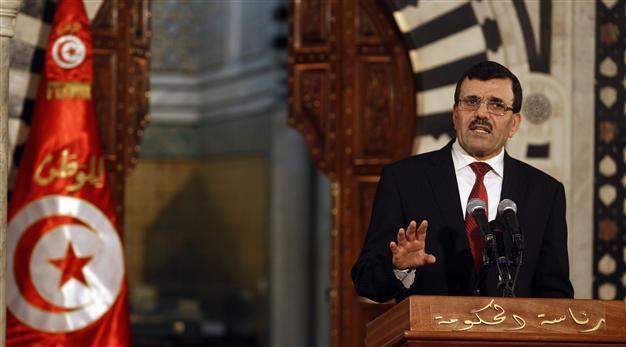Salafist group behind Tunisia political killings: PM
TUNIS - Agence France-Presse

Tunisia's Prime Minister Ali Larayedh speaks during a news conference in Tunis August 27, 2013. REUTERS photo
Tunisia's Islamist Prime Minister Ali Larayedh on Tuesday accused the country's main Salafist movement, Ansar al-Sharia, of "liaising" with Al-Qaeda and of being behind the assassinations of two opposition politicians.
Ansar al-Sharia "is responsible for the assassinations of (Chokri) Belaid and (Mohamed) Brahmi, as well as our martyrs in the police and the national army," Larayedh told a news conference, referring to the two politicians killed in separate attacks in February and July.
"We have decided to class Ansar al-Sharia as a 'terrorist organisation,'" he added.
"Ansar al-Sharia is liaising with AQIM (Al-Qaeda in the Islamic Maghreb)," said Larayedh, while pledging that Tunisia would fight against the group "whatever the sacrifices." The assassinations of Belaid and Brahmi, within just six months of each other, both triggered crises in the North African country, with Belaid's murder in February eventually bringing down the government of then Islamist premier Hamadi Jebali.
The killing of Brahmi, on July 25, has also sparked mass protests and calls for the resignation of the government led by Ennahda, the moderate Islamist party of Jebali and Larayedh.
While the authorities had already accused members of Ansar al-Sharia of involvement in the two killings, they had not held the movement itself responsible.
Larayedh also said the extremist group was supporting an armed jihadist cell which the Tunisian army has been hunting for months, in the remote Mount Chaambi region along the Algerian border.
More than 10 soldiers have been killed since the army intensified its operations there at the end of July.
"This organisation is implicated in the terrorist operations in Tunisia," Larayedh said.
"It is responsible for a weapons storage network, it is responsible for planning assassinations, and attacks against security and army posts," he added. The Tunisian premier said his claims were based on evidence and the "confessions of suspects." "Everyone belonging to this organisation must assume complete responsibility for belonging to a terrorist organisation." The Ennahda-led government has been strongly criticised for failing to rein in Tunisia's extremist groups, especially Ansar al-Sharia, which the Islamist party initially favoured dialogue with.
But in recent months it has taken a much tougher stand towards the Salafist movement, which was also blamed for a deadly attack on the US embassy last September.
Ansar al-Sharia's leader, Saif Allah Bin Hussein, a former Al-Qaeda fighter in Afghanistan known as Abu Iyadh, was accused of orchestrating the attack and has been on the run from the police ever since.
The Salafist group has always denied any involvement in the violence that has intermittently rocked Tunisia since the revolution that toppled president Zine El Abidine Ben Ali in January 2011, insisting that its activities were focused on preaching.
But in May Abu Iyadh threatened to wage "war" against the government, after the authorities banned his movement's annual congress and sent reinforcements to combat jihadists in the western border region.
